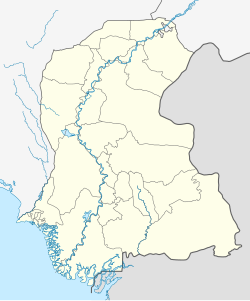Shahdadpur
Shahdadpur
شهدادپور | |
|---|---|
City | |
 Railway Station Shahdadpur | |
| Etymology: Mir Shahdad Khan founded Shahdadpur during 1125-1128 AH (1713-1715 AD) as the capital of upper Sindh | |
| Coordinates: 25.9268° N,
68.6261° E 25°55′22″N 68°37′14″E / 25.92278°N 68.62056°E | |
| Country | Pakistan |
| Province | Sindh |
| District | Sanghar |
| Population | |
• City | 113,342 |
| Postal code(s) | 68030[2] |
| Telephone code | 0235 |
| Official language | Sindhi, Urdu |
| Website | www.shahdadpur.ga |
Shahdadpur (Sindhi: شهدادپور) is the capital city of Shahdadpur Taluka, Largest taluka in Sanghar District by population. It is 20th largest city in Sindh, Located in centre of the province.
It is associated with a number of Islamic scholars and Sindhi poets including Allama Asad Raza Ul Hussaini by the title of Kahteb e Musaferah Sham and poet of sindh Muhammad Dawood Bhutto "Daadan" and Shah Abdul Latif Bhittai, whose shrine is about 10 kilometres (6.2 mi) from Shahdadpur in Bhit Shah.
History
[edit]According to N.A. Baloch, the former vice-chancellor of Sindh University, Mir Shahdad Khan, son of Rasheed Khan, founded Shahdadpur with the help of the Leghari administrators during 1125-1128 AH (1713-1715) as the capital of upper Sindh.[citation needed] In 1116 AH (1704 AD), the younger Khan was referred to as Riffat Panah, which means "His Eminence". Mir Shahdad Khan had barren lands cultivated, and provided security for its people by reducing crime. He established a system for sharing produce between owners and farmers. He had aging canals and waterways renovated and extended, and dug new canals that helped establish the settlement.[3]
Legend of Sohni Mehar
[edit]It is believed that originally they used to belong near Shahdadpur and their story became popular and poets of Punjab used to sing this in their poems. Thus they made their own version of the folk tale sohni mehar, near shahdadpur there are many places which are associated with their names.[3]
City and people
[edit]Ethnicities in Shahdadpur include



